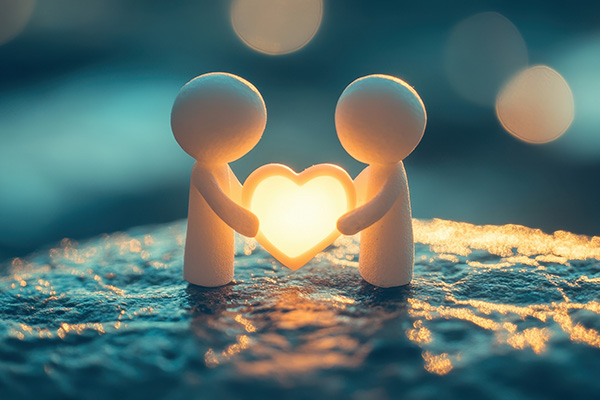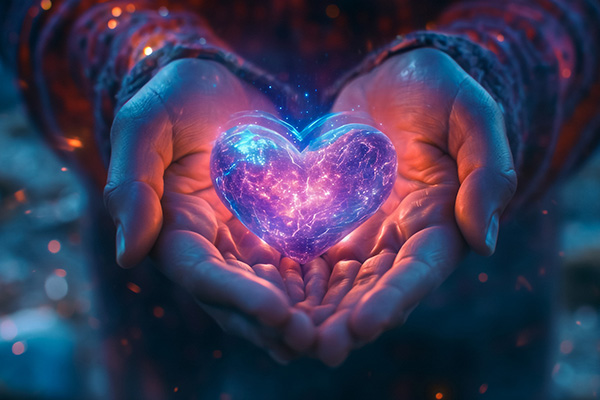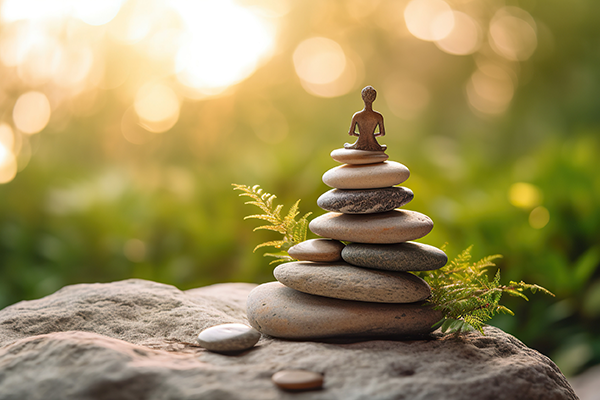joy
Love Is Not Just A Battery, It’s Also A Boomerang!
 Love is like a battery. Love is also like a boomerang.
Love is like a battery. Love is also like a boomerang.
When your energy is low, you may feel depleted and think you don’t have any more love to give. The opposite is also true. Complimenting a stranger or showing love to an animal or person re-energizes your battery.
Love is infinite, not finite. The love and joy you give to others comes back to you.
In fact, I often tell my yoga students and psychic clients who are struggling with depression or sadness to compliment at least ten people each day.
It can be something as simple as saying, “I love that shirt!” or “Your writing is so neat!” The smile on that person’s face raises your vibration, healing you as well as them. Most people are struggling with some kind of challenge, and that one compliment can change their day.
Studies have shown that smiling releases hormones that make you happy, while frowning releases hormones that make you sad. Laughing and crying intensifies these hormones. So, smiling at someone or laughing can actually raise your joy level and vibration.
We live in a hate and frustration driven world lately where people are increasingly divided and constantly judging and attacking each other. I belong to several social media groups where people constantly being unkind and intolerant to others. Continue reading
True Love Has No Time Limit, And No Deadline!
 We live in a busy world where most of us have gotten used to a very hurried life. Everything is on a strict schedule and time limit, because we now judge everything this way.
We live in a busy world where most of us have gotten used to a very hurried life. Everything is on a strict schedule and time limit, because we now judge everything this way.
We have become a restless society demanding instant solutions and immediate gratification in all things.
If the line is too long at the supermarket or fast food restaurant, some of us get upset. If we have to wait for our doctor when we have an appointment, we become annoyed. Some cut in front of others, or even cross streets while the light is still red, because they hate to wait.
Similarly, if we do not get an immediate reaction from our latest love interest, some of us do not become just a little restless or anxious. No, they get really upset!
If this kind of hurried, rushed way of life plagues you, then you may definitely need an major attitude adjustment. Because your naturally loving heart and your capacity for love and romance may be in serious trouble.
Maybe your heart never got the memo that there was no need to constantly hurry up and adhere to time limits and deadlines.
What happened to dating? Romantic chats? Patiently anticipated expressions of affection? Dozens of love letters, and more recently emails and test messages? The joint holidays and weekends away? The looking forward to new adventures together?
Your Sacred Center Of Self-Love
 We all thrive on being loved. This is natural, of course, if you look back at humanity in history on an evolutionary level. Ancient people came together in tribes, families, and groups, to cultivate a place of safety, security, nurturance, and love.
We all thrive on being loved. This is natural, of course, if you look back at humanity in history on an evolutionary level. Ancient people came together in tribes, families, and groups, to cultivate a place of safety, security, nurturance, and love.
If you were different or stood out in any way, or even left the tribe, you were literally putting your own life at risk. This topic can be viewed from so many arenas, including psychological, spiritual, scientific, and psychic.
I often wonder how and when did we start defining ourselves by how others felt about us, and why did we believe that other’s thoughts about us were true? At what point in time did we allow others to define us? It’s as though we as humanity went into a deep trance.
We all know the phrase, “Love thyself first”. When did we forget this vital piece of information?
There are many ways we can come back in touch with this essential truth, but for the most part, our society does not support a lifestyle that would naturally lead us back to our sacred center of self-love.
How often do you take a moment to look in the mirror, or tell yourself, “I love you?” Most of us feel silly doing this, but it is very healing.
Have you ever met an older person who behaves in ways that are foolish or who just doesn’t give a hoot what anyone else thinks? My paternal grandfather used to throw dinner rolls across the table at me in fancy restaurants. While my parents and other family seated at the table would roll their eyes at my Grampy, I used to laugh hysterically!
You Are A Human Being, Not A Human Doing!
 We are living in a fast-paced world where we feel we must do many things every day, hardly having much time to just be. To just stop. To think. To just be.
We are living in a fast-paced world where we feel we must do many things every day, hardly having much time to just be. To just stop. To think. To just be.
Instead of embracing the fact that we are a human beings, we are in this day and age more focused on being humans doing.
We get caught in up in the web of life, with its chaos and drama. And we get frustrated and feel so rushed. There is no time to truly do the things we want to do; to spend time doing the things that matter the most.
Today, take a moment to just sit for a few minutes and simply do nothing.
Meditate. Just think about nothing and if thoughts come in, ask yourself: is this thought helping me to get in alignment with my true self? Am I in touch with the higher self that allows happiness to be a part of my space and life?
If the thoughts that are coming in are not happy or healthy, or not helping you to be spiritually aware and give you that feeling of being fulfilled, then you just allow them to go in and out. Just let it be.
No need to over think, or evaluate, or spend energy on it. Just let it go. If a thought comes in and it’s a stressor for you, note it and remember to maybe get rid of that thought or person from your life.
Wishing You A Blessed Holiday Season
 Valued clients, as we approach the close of another remarkable year, our hearts are filled with gratitude for your continued loyalty and support.
Valued clients, as we approach the close of another remarkable year, our hearts are filled with gratitude for your continued loyalty and support.
Your trust, courage, and commitment to your personal and spiritual growth have made 2025 a year of profound connection and meaningful transformation. We are humbled and honored to walk this sacred path with you every day.
Your calls motivate and inspire us daily. You remind us why we do what we do. Why we show up, hold space, offer guidance, and continue striving to uplift every soul who seeks the guidance of spirit.
Because of you, our mission continues, our purpose endures, and our dedication to service remains with each passing season.
This year, through triumphs and trials alike, we have witnessed your resilience, your breakthroughs, and your beautiful unfolding to live your best life.
It has been our privilege to support you this past year as you navigated life’s shifting tides, embraced new opportunities, and stepped ever more fully into your authentic power.
We look forward to continuing this sacred partnership with you, offering clarity and spiritual insight whenever you need it.
The holiday season reminds us of the things that matter most in life: compassion, love, inner peace, and the quiet miracles that shape our lives. It is a time to cherish the connections that uplift us and to honor the divine spark that flows through us all. May this season bring you moments of stillness, heartfelt joy, and the comforting warmth of those who love and cherish you.
How To Have A Peaceful Christmas This Year
A s magical a time of year as Christmas may be, it can still be somewhat stressful.
s magical a time of year as Christmas may be, it can still be somewhat stressful.
Nevertheless, with a little pre-planning, you should be able to get your Xmas off to a good start and enjoy the celebrations to the maximum without experiencing too much stress and drama in the process!
How good is that? Here’s how.
Set Clear Intentions
Let go of the idea that Christmas must be traditional and ‘perfect,’ and that you must make it that way for everybody. Set instead a clear intention for what your ideal Christmas will be.
After that, all you need to do is make plans that go along with your vision. Having established what Christmas really means to you, you can then use it as a guide to prepare your celebrations.
Keep It Simple
Simplicity ensures peace and calm, whereas complexity causes stress and drama. It really is as simple as that! It is imperative that any Christmas plans you make are as simple, straightforward and as streamlined as possible. Doing so should help to create a sense of calm and empowerment, which you will no doubt need to take into the New Year with you.
 I was meditating deeply one afternoon wanting to connect with my spirit guide. I wanted to see if I there was anything that I needed to know, or anything that could help me be a better person. I then heard the words: “Time waits for no one.”
I was meditating deeply one afternoon wanting to connect with my spirit guide. I wanted to see if I there was anything that I needed to know, or anything that could help me be a better person. I then heard the words: “Time waits for no one.”